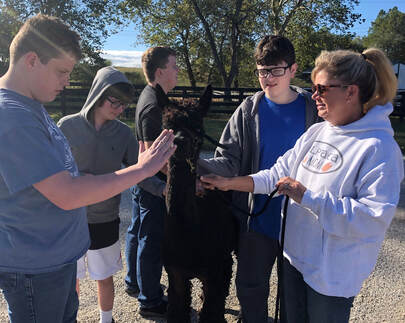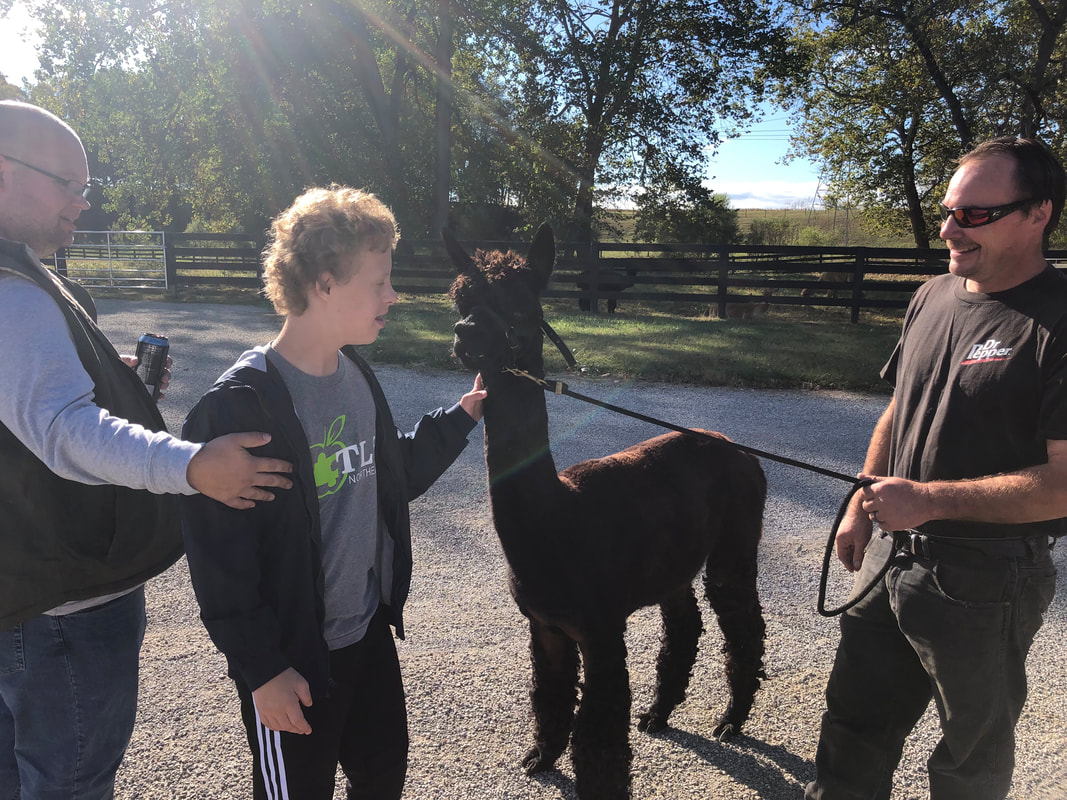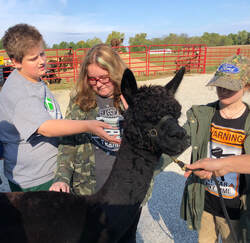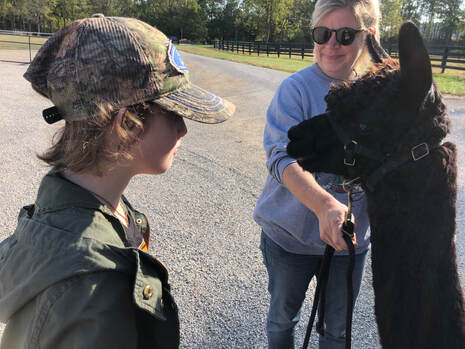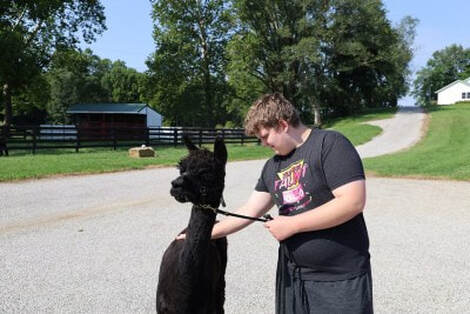|
Hand in hand with our students, we have developed an animal assisted alpaca therapy program for people on the autism spectrum, one of only a few in the world tailored specifically for autism. Our program has 6 amazing alpacas and our pilot job training and alpaca therapy program launched in April 2023. Since 2019 we have been constructing our farm, including the barn, retail shop/workspace and pastures needed to establish our job training program. In 2023 we completed our final phase of construction to bring in our alpacas.
Stay tuned as we grow our program and contact us to get involved! |
-
Why Alpacas?
-
Alpaca Assisted Therapy Videos
<
>
Individuals with autism face many challenges including difficulties associated with social pragmatics, social interaction, eye contact and reading non-verbal behavior, sensory over sensitivity and repetitive behaviors. Many persons with ASD (autism spectrum disorder) have markedly constrained repertoire of activities which can also be developmentally inappropriate. The scientific community agrees that early intervention can foster growth and development. Despite high quality intervention such as is provided at The Learning Spectrum many individuals with autism will require ongoing intervention and support across the life span.
The use of animals as part of a therapeutic intervention program has demonstrated noticeable benefits. Researchers in the field of animal assisted therapy suggest that animals may act as a social catalyst while assisting the individual with autism to become more comfortable within the therapeutic environment (Fine, 2006). Ming-Lee Yeh (2008) concluded that animal assisted therapy was helpful to children in recognizing their environment as well as practicing higher level interpersonal skills. Grandin and Johnson (2006) hypothesize that one of the reasons why some individuals with autism relate well to animals is due to sensory-based thinking (thinking in pictures, smells, sounds, etc.).
Interacting with alpacas and other therapy animals can have a calming, centering effect for people on the spectrum, lower blood pressure, reduce anxiety, and help teach interpersonal skills. A few pilot programs around the world use alpacas as therapy animals for people with autism, and are showing positive results. Lacey Burgess, an animal assisted therapist, says that working with alpacas “can teach kids about responsibility, gain a rapport, trust and respect. You can kind of use these guys to really get your point across about any kind of life skills topic that you need to.”
At Learning 4 Life Farm, individuals with autism will be introduced to the alpacas in a quiet space away from fluorescent lighting or other sensory distractions. Participants will learn about alpacas and their care.
The use of animals as part of a therapeutic intervention program has demonstrated noticeable benefits. Researchers in the field of animal assisted therapy suggest that animals may act as a social catalyst while assisting the individual with autism to become more comfortable within the therapeutic environment (Fine, 2006). Ming-Lee Yeh (2008) concluded that animal assisted therapy was helpful to children in recognizing their environment as well as practicing higher level interpersonal skills. Grandin and Johnson (2006) hypothesize that one of the reasons why some individuals with autism relate well to animals is due to sensory-based thinking (thinking in pictures, smells, sounds, etc.).
Interacting with alpacas and other therapy animals can have a calming, centering effect for people on the spectrum, lower blood pressure, reduce anxiety, and help teach interpersonal skills. A few pilot programs around the world use alpacas as therapy animals for people with autism, and are showing positive results. Lacey Burgess, an animal assisted therapist, says that working with alpacas “can teach kids about responsibility, gain a rapport, trust and respect. You can kind of use these guys to really get your point across about any kind of life skills topic that you need to.”
At Learning 4 Life Farm, individuals with autism will be introduced to the alpacas in a quiet space away from fluorescent lighting or other sensory distractions. Participants will learn about alpacas and their care.
For more information on the benefits of animal assisted alpaca therapy, check out the videos below!
|
|
|
|
Historically, young adults with autism have the poorest employment outcomes among young adults with disabilities. In recent years, researchers looking at employment outcomes found that when young adults with autism have opportunities to participate in programs that adequately prepare and support them as they enter the workforce, they can be successful and valuable employees. Other studies that examined employment rates among young adults with autism show that there remains a significant need for programs that strengthen employment skills and provide opportunities for practice. Alpaca assisted therapy programs have been shown to have positive effects on people with ASD that can translate into skills they can apply to their everyday life.
Learning 4 Life Farm is designed to provide a venue where young adults with autism will have opportunities to explore employment options and practice valuable workplace skills including, growing and harvesting flowers and vegetables, and creating and selling products in the gift shop. Additionally, the Farm is a place where individuals of all ages with autism can experience the wonders of nature and the outdoors, enhance their well-being through active or passive involvement during plant and plant-related activities, develop age-appropriate leisure skills away from tablets and computer screens and interact with our alpacas in a sensory friendly environment.
Learning 4 Life Farm is designed to provide a venue where young adults with autism will have opportunities to explore employment options and practice valuable workplace skills including, growing and harvesting flowers and vegetables, and creating and selling products in the gift shop. Additionally, the Farm is a place where individuals of all ages with autism can experience the wonders of nature and the outdoors, enhance their well-being through active or passive involvement during plant and plant-related activities, develop age-appropriate leisure skills away from tablets and computer screens and interact with our alpacas in a sensory friendly environment.
We are excited to provide our kids with a sensory friendly environment to work with and care for alpacas!

